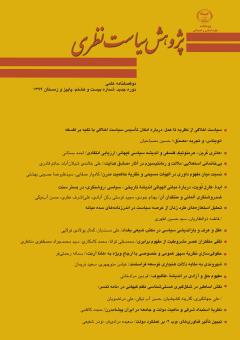بیخانمانی استعلایی: ملالت و رمانتیسیزم در آثار «صادق هدایت»
محورهای موضوعی : Research in Theoritical Politicsعلی خالندی شیلان آباد 1 , حاتم قادری 2
1 - دکتری اندیشه سیاسی، دانشگاه تربیت مدرس
2 - گروه علوم سیاسی، دانشگاه تربیت مدرس
کلید واژه: بی¬خانمانی استعلایی, صادق هدایت, ملالت, رمانتیسیزم, هرمنوتیک. ,
چکیده مقاله :
بی خانمانی استعلایی ناظر بر وضعیتی است که در آن انسان، پیوندش با منابع معنابخش -که به هستی و بودنش معنا عطا می کردند- می گسلد. انسان، فرزند زمان/مکانی معین است و هر رویدادی که سامان آن پیوستار را برآشوبد، سوبژکتیویته را نیز برخواهد آشفت. هرگاه وضعیت سامان زمان/مکان، بحرانی شود و منابع استعلایی معنابخش، از دسترس انسان خارج شوند، او به بی-خانمانی استعلایی دچار می آید. مهم ترین پیامدهای بی خانمانی استعلایی، ملالت و رمانتیسیزم است. انسانی که از زمان/مکانش واکنده شده و آنها را با خود بیگانه می یابد، به ملالت دچار خواهد آمد و سیمایی ذهنی از جهان، آنگونه که مطلوبش است، درخواهد انداخت. رمانتیسیزم در حالت اخیر و در خلال این رؤیابینی رخ خواهد نمود. به این اعتبار، صادق هدایت را نیز که یکی از مهم-ترین نویسندگان تاریخ معاصر ماست و در یکی از بزنگاه های تاریخی مهم ما می زیسته است، میتوان دچارآمده به بی خانمانی استعلایی دانست.
Transcendental homelessness implies a situation in which collapses human’s connectedness with the meaningful resources, which give meaning to the human existence and being. Human being is the child of a certain time/space, and any event which disturbs the continuum will also disturb subjectivity. Whenever the state of time/space order gets into crisis and meaningful transcendental resources become inaccessible to human, he suffers from transcendental homelessness. The most important consequences of transcendental homelessness are depression and romanticism. If human being lose his/her roots in time/place and find it alienated with himself/herself, then get depressed; For the purpose of making it tolerable, he/she creates a subjective world which can satisfy him/her. Romanticism is the very consequences of that subjective world. Sadeq Hedayat, one of the most important writers in our contemporary history, based upon our propositions in this article, has suffered from transcendental homelessness.
Freud, Sigmund (2002), Leonardo Da Vinci: A Memory of His Childhood, Translated by Alan Tyson, London: Routledge and Kegan Paul Ltd.
-Frondizi, Risieri (1972), Are Truth and History Incompatible?, in Gadamer, Hans-Georg (1972), Truth and Historicity/Verite et Historicite, Hague: Springer
Gadamer, Hans-Georg (1977), Philosophical Hermeneutics, Translated and edited by David E. Linge, Berkeley: University of California Press
- Gadamer, Hans-Georg (1985), Philosophy and Literature, translated by Anthony J. Steinbock, Man and World, Vol. 18, pp. 241-259
Gadamer, Hans-Georg (1989), Truth and Method, translation revised by Joel Weinsheimer and Donald G. Marshall, Second revised edition, London: Continuum
Gadamer, Hans-Georg (2007), The Gadamer Reader: A Bouquet of later Writings, trans, and ed. Richard E. Palmer, Evanston, IL: Northwestern University Press
Gjesdal, Kristin (2015), History and Historicity, in Malpas, Jeff and Gander, Hans-Helmuth (2015), The Routledge Companion to Hermeneutics, London: Routledge
Gjestal, Kristin (2016), Truth, in Keane, Niall and Lawn, Chris (2016), The Blackwell Companion to Hermeneutics, West Sussex: Wiley Blackwell
Grondin, Jean (2002), Gadamer’s Basic Understanding of Understanding, in Dostal, Robert J. (2002), The Cambridge Companion to Gadamer, Cambridge: Cambridge University Press
Grondin, Jean (2016), The Hermeneutical Circle, in Keane, Niall and Lawn, Chris (2016), The Blackwell Companion to Hermeneutics, West Sussex: Wiley Blackwell
Healy, Paul (2015), Truth and Relativism, in Malpas, Jeff and Gander, Hans-Helmuth (2015), The Routledge Companion to Hermeneutics, London: Routledge
Misgeld, Dieter; Nicholson, Graeme (1992), Hans-Georg Gadamer on Education, Poetry, and History: Applied Hermeneutics, New York: State University of New York
Simms, Karl (2015), Hans-Georg Gadamer, London: Routledge


